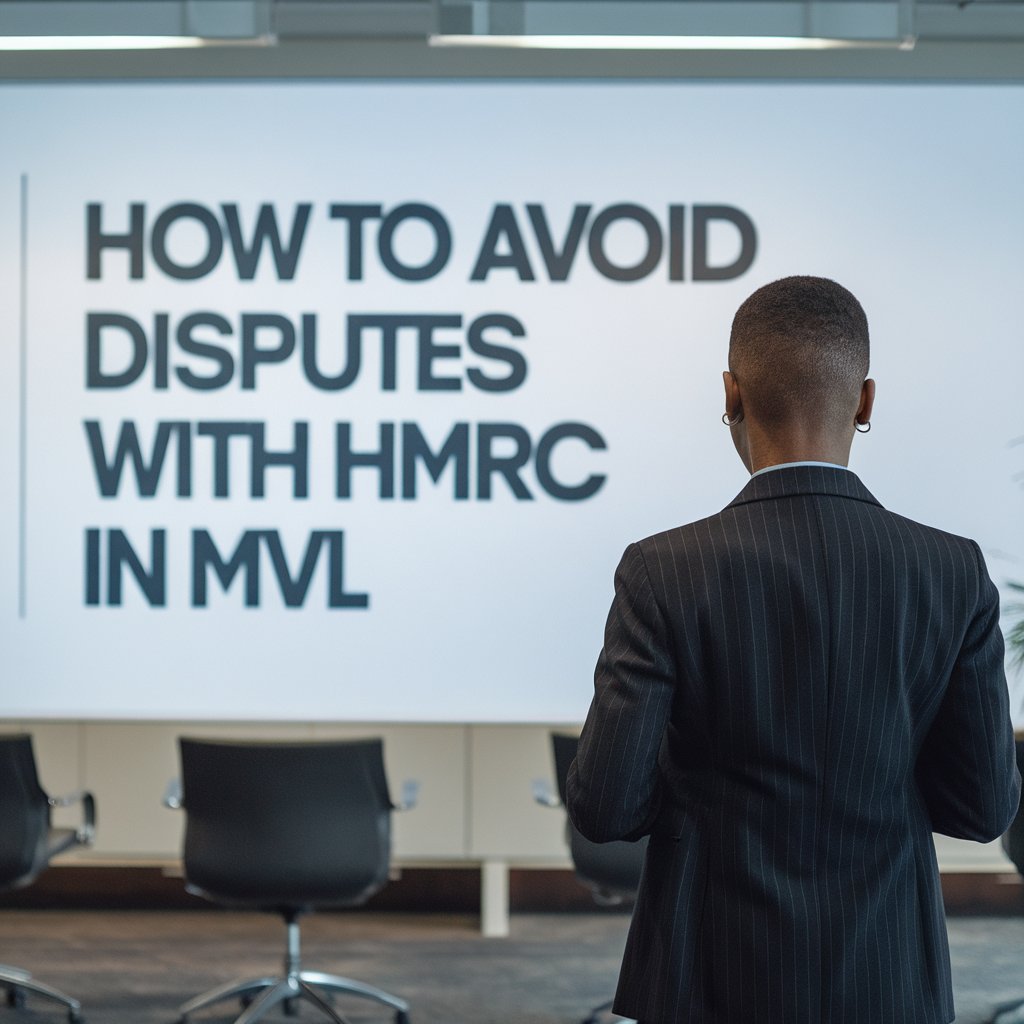What Happens When You Hire an Insolvency Practitioner Many UK directors and business owners face stressful financial problems—ranging from mounting debts to the risk of compulsory liquidation. When these challenges surface, seeking professional support can be the turning point. Hiring an insolvency practitioner UK for your company brings legal protection, business rescue opportunities in the […]
How to Avoid Disputes with HMRC in MVL
Begin by illustrating how challenging HMRC inquiries can become for directors aiming to close their company through a Members’ Voluntary Liquidation (MVL). Highlight the importance of swift tax clearance, accurate filings, and timely responses to HMRC checks. Emphasise that a well-managed MVL not only accelerates the closure process but also protects directors from potential creditor action or regulatory complications. Conclude by noting that solid professional support and proactive planning keep HMRC disputes at bay. Continue by setting the context for UK insolvency services, underlining the vital role of Nexus Corporate Solutions. Signpost that this guide will cover methods to reduce the likelihood of HMRC objections, the typical timelines for receiving HMRC clearance, and the crucial steps directors can follow to achieve a smooth liquidation. The focus remains on practical, regulation-based insights that ensure compliance and efficiency throughout the process. Explain that HMRC scrutinises outstanding tax liabilities, including corporation tax and VAT compliance. Note how this process safeguards the public purse and enforces UK tax legislation. Clarify that most MVLs are straightforward, but HMRC can raise additional enquiries if they suspect missing information or historical underpayments. Stress that early communication and thorough record-keeping minimise the risk of lengthy reviews or objections. Identify common triggers, such as incomplete returns, suspected tax avoidance, or mismatches between filed accounts and HMRC records. Emphasise that even minor discrepancies can prompt an extended review. Note that HMRC’s Litigation and Settlement Strategy means they must ensure taxes are accurately settled before final distributions. Underscore the importance of carefully completing all submissions to reduce delays and to minimise tax in MVL effectively. Acknowledge there is no strict timeline for HMRC’s sign-off, though many liquidators anticipate a wait of several weeks or a few months. Highlight that factors such as creditor claims, unresolved tax issues, or complex VAT legislation interpretation can prolong the process. Remind directors that prompt and complete disclosure often results in a faster resolution, sparing directors unnecessary stress. Explain that HMRC may object if statutory returns remain unfiled, there are missing payments, or there is evidence of potential tax evasion. Mention that if a formal objection is raised, distributions might be halted until the matter is resolved. An experienced insolvency practitioner can manage such disputes efficiently by liaising with HMRC and applying formal or alternative dispute resolution strategies to avoid prolonged delays. Essential techniques for preventing tax disputes, including transparent financial disclosures, regular engagement with HMRC, and employing professional tax advice to clarify any compliance uncertainties. Emphasise that thorough document management is indispensable. Proactive efforts, such as submitting accurate returns and swiftly responding to any HMRC query, can considerably reduce the chance of escalated tax disputes that may disrupt the MVL timeline. Why seeking expert help from an insolvency practitioner—Nexus Corporate Solutions—proves invaluable. Note the significance of specialised knowledge in UK tax dispute governance, VAT compliance, and statutory review procedures. Discuss how these practitioners navigate the complexities of tax tribunal appeals, handle potential ADR (alternative dispute resolution) processes, and maintain even-handed tax settlements that protect directors’ interests. Underscore that this expertise fosters confidence and smoother communication with HMRC. Cite realistic scenarios where a lack of proper oversight results in protracted tax disputes and delayed distributions. Show how a director’s personal liability or business reputation can be affected if HMRC suspects misreporting. Prompt alignment with HMRC guidance or law, decisive action on overdue accounts, and careful collaboration with an insolvency practitioner can preserve a director’s standing and finalise liquidation without damaging fallout, while also offering key insights on family-owned companies in MVL. Explain the hands-on methodologies Nexus Corporate Solutions adopts. Emphasise tailored strategies, starting with a thorough financial review, ensuring transparency in tax dispute processes, and resolving any legacy accounting gaps. Mention how their team ensures all statutory documentation is submitted accurately and on time, reducing HMRC scrutiny in tax disputes. Conclude by noting that this supportive, client-focused approach streamlines the winding-up process and protects directors from unnecessary concerns. Reiterate that a proactive strategy can spare directors unnecessary HMRC disputes in MVL. Summarise the key takeaways: maintaining accurate records, swiftly addressing HMRC requests, and seeking guidance from experienced professionals like Nexus Corporate Solutions. With careful planning, MVL can be wrapped up smoothly, freeing directors to move forward confidently. Invite them to engage with Nexus Corporate Solutions for a confidential consultation that secures prompt, compliant closure while safeguarding business value and lasting peace of mind.HMRC’s Role in an MVL
Why Does HMRC Delay MVL Distributions?

How Long Does HMRC Take to Respond in MVL?
HMRC Objections in MVL Process
Steps to Avoid Disputes with HMRC

Seeking Professional Expertise
Real-World Implications for Directors
Nexus Corporate Solutions’ Approaches

Conclusion
How Are Insolvency Practitioners Appointed – UK Expert Guide Navigating financial turmoil can be overwhelming for company directors and sole traders alike. Faced with mounting debts, threats of compulsory liquidation, or creditor demands, knowing “how insolvency practitioners are appointed” becomes crucial for preserving your organisation. In the UK, professional insolvency services, such as company voluntary […]
Administration might be your lifeline when your company's drowning in debt and creditors are circling. But here's what most directors don't understand: it's not just about buying time — it's about buying the right kind of time, with the proper professional support. The difference between administration working for you or against you often comes down […]
Can an Insolvency Practitioner Stop Creditors? In the UK, mounting pressure from creditors can disrupt cash flow, increase stress for directors, and push a company toward insolvency. Professional guidance plays a pivotal role in countering these challenges. Nexus Corporate Solutions Limited specialises in helping businesses find relief from persistent creditors, providing strategic solutions that align […]
When your company's in financial trouble, one of the biggest worries is what happens to everything you've built. Your equipment, property, stock — the assets that represent years of hard work. It's a valid concern, and you're not alone. The reality? How insolvency practitioners handle your company's assets can make or break the outcome for […]
Insolvent trading can trigger severe repercussions for UK directors, including personal liability and possible disqualification. When a business is unable to pay debts and continues to trade without a reasonable prospect of avoiding insolvency, the law may classify this as wrongful trading. The Insolvency Act 1986, alongside related legislation, outlines civil and criminal penalties for […]
Recognising the signs of business insolvency early is vital for UK companies. Overlooked warning signals—such as recurring cash flow issues, unpaid HMRC tax arrears, or missed staff wages—can quickly escalate into serious risks that demand immediate attention. Being aware of these common signs of business insolvency enables directors to take timely action, whether through careful […]
Supplier insolvency can have serious consequences for UK companies, creating ripple effects that extend beyond the affected supplier. Cash flow interruptions, delayed payments, and increased operational risks are common outcomes. When a key supplier or client becomes insolvent, contracts may be disrupted, insurance coverage can be affected, and overall profitability may decline. Nexus Corporate Solutions […]
Struggling with IVA monthly payments can feel overwhelming, especially when daily financial obligations pile up. An Individual Voluntary Arrangement (IVA) is designed to help those in debt regain stability by consolidating and managing repayments under a legally binding agreement. However, life changes—like reduced monthly income, sudden expenses, or shifts in personal circumstances—often make sticking to […]
Experiencing financial difficulty can make everyday life more challenging, especially when an individual or business director needs to secure a stable living arrangement. In the UK, an Individual Voluntary Arrangement (IVA) offers a legally binding debt solution that eases pressure from creditors. However, many worry about problems renting after IVA. Questions about how this might […]

Address: Apex Building, 1 Water Vole Way, Balby, Doncaster, South Yorkshire, DN4 5JP
Tel: 01302 430180
Services
Company


